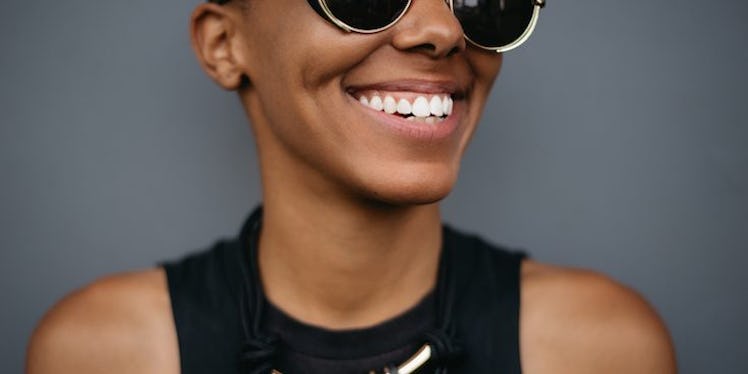
This Is Why You Need To Start Using Charcoal Powder On Your Teeth
There seem to be new and, at times, totally random wellness trends that pop up out of nowhere every single day. From the benefits of apple cider vinegar on acne, to oil pulling, to even snail masks, there's always some new thing that totally works that you absolutely need to try -- which is why I was a little skeptical when I heard people wholeheartedly recommend using charcoal powder on your teeth. Like, charcoal? As in the stuff that goes in barbecue grills and the Christmas stockings of poorly behaved children? Is charcoal powder safe for your teeth?
Yes, people, we are talking about that charcoal. While it might seem more than a little counterintuitive to rub black ash on your pearly whites, there are apparently some major benefits to this oral practice, which has its root in traditional Chinese and Ayurvedic medicine. The major one, in fact, is teeth whitening.
Just as an FYI, charcoal is a pretty interesting substance in and of itself. It's made from things like wood, peat, coconut shell, or petroleum by heating these materials in the absence of oxygen, and removing any water and other changeable chemical components. What's left is carbon and ash residue, aka what we know to be charcoal.
But the kind of charcoal you put on your teeth (and the kind you'll see in smoothies or face wash, too) is "activated" charcoal.
This means, when it's produced, a piece of regular old charcoal is heated in the presence of a gas that causes the charcoal piece to develop internal “pores,” which are thought to magnetize, trap, and wipe away chemicals, toxins, and viruses.
It's basically a little black, ashy, germ-killing sponge -- aka a potential superhero for your teeth.
Additionally, on your teeth, activated charcoal is supposed to be super badass at removing really stubborn stains that come from things like coffee and wine, or simple day-to-day wear, tear, and discoloration. Plus, it helps to kill the bacteria that causes stinky breath.
Dr. Mark Wolff, DDS, professor and chair of the Department of Cariology and Comprehensive Care at the New York University College of Dentistry, told the Daily Beast that activated charcoal “absorbs impurities,” which is why it's often found in air filters, or in hospitals to treat accidental poisoning or even drug overdoses.
However, Dr. Wolff also explained there isn't much scientific proof when it comes to the effectiveness of activated charcoal powder as a teeth-cleaning treatment.
So, while your best bet is still probably going to be using something with fluoride (and regular brushing and flossing, of course), it still could be worth a shot to try out charcoal powder. I mean, come on, aren't you curious to know what a bunch of black sh*t will really do to your teeth?
If you're down to experiment with it, there are a few different ways to go about it. There's the simple, straight up charcoal powder you can rub on your teeth. There are capsules you break apart then add water to, which then turns into powder. And finally, there are toothpastes that actually have activated charcoal in them as a main ingredient.
In fact, that might be a really good place to start if you're a little shy about the whole concept of black, dirty-looking teeth. Be sure to talk to your dentist or another personal physician to see if it's a good option for you. Who knows, you might just wipe away that sooty darkness to discover your loveliest smile yet!
And hey, if you're still a bit hesitant on the whole charcoal thing, maybe it'll help to know wellness gurus galore swear by the stuff to help with gut detox, acne, hair-cleaning, and even bug bite relief.
I, for one, am definitely going to give activated charcoal teeth whitening a shot. I'll let y'all know how it goes.